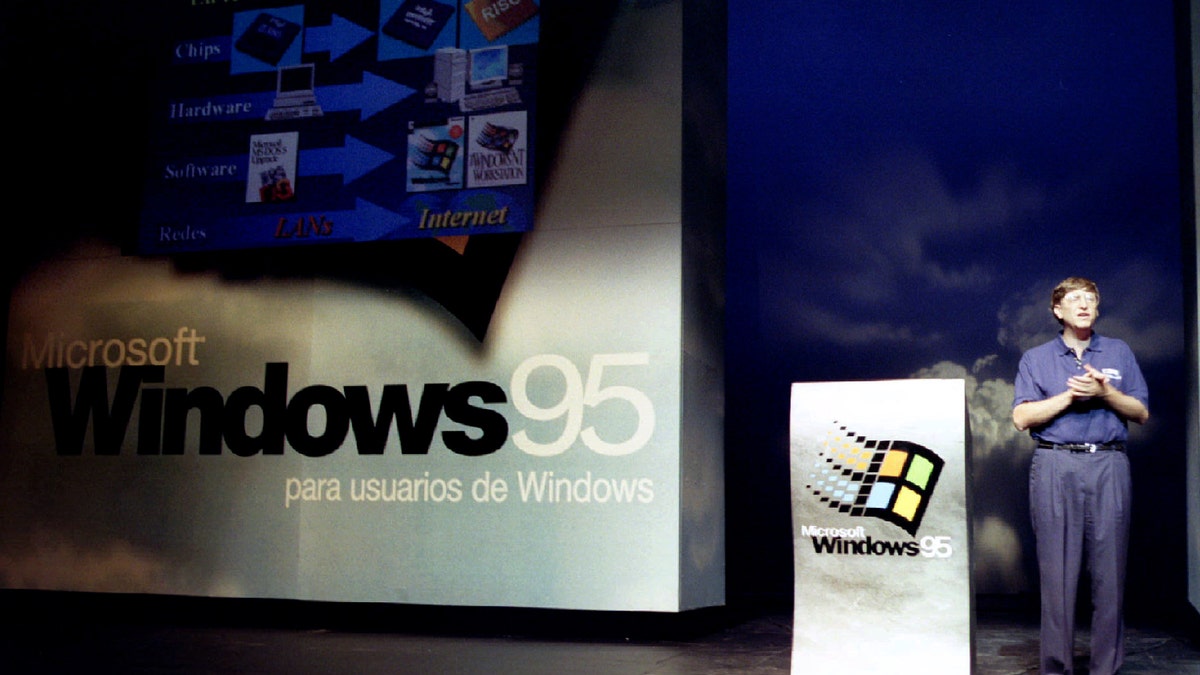
Bill Gates, chairman of software giant Microsoft, stands on stage during the launching of the new Windows 95 software to Spanish clients Sept. 5 at a Madrid theatre (Reuters).
The majority of teenagers alive today weren't alive in the 90s, meaning the oldest version of Windows they're likely to be familiar with is Windows XP.
If that tidbit makes you feel old, you might not want to watch the latest React video from Fine Brothers Entertainment, in which a bunch of teenagers are exposed to the wonders of mid-90s computing and Windows 95 for the first time in their lives. They're not impressed.
Related: Users heard the Windows 95 startup music for the first time 20 years ago today
It starts with first impressions.
"The fact that the monitor is bigger than the actual computer itself says a lot" said Daniel, 17 years old, who is young enough to only have vague memories of monitors and TVs that aren't flat.
"I've no clue what year this is from, but I feel like it was before the year I was born," said Geneva, age 18, after seeing the mid-90s Dell. Her math checks out.
The design flaws we all got used to are evident right away. When asked to turn on the computer, everyone hit the big button on the monitor and waited, something we all probably remember doing at some point. When the computer was turned on, the reactions kept coming.
"I don't think I've ever heard a computer make these sounds before in my life," said Morgan, age 19, making anyone who felt nostalgic upon hearing the floppy drive click instantly feel 10 years older.
Then the teens waited for the BIOS screen to go away.
"This is taking a while," said Karan Brar, reminding the entire planet what life was like back in ancient times when computers took five minutes to start up and Pterodactylus savaged our cattle.
Related: If you thought Windows 8 was bad, here are 6 operating systems that failed miserably
Things don't get much better when the operating system's boot screen is revealed.
"95, as in, like, 1995?" asked Alicia, age 16, who has no memories of the 90s but will be able to vote in just two years.
Then the operating system finally booted.
"Everything looks so dull and ancient," said Brar.
"It seems more rough, the edges are more sharp, it's a little more impersonal," said Nora, age 18, who judging by that comment might have a future as a graphic designer.
But perhaps the hardest thing to understand for the teens was the lack of wireless connectivity.
"How do you get on the Internet if there's no Wi-Fi?" asked Alicia, as though the question itself were nonsense.
When the produced tried to explain dial-up, things got even more confused.
"You'd have to use your phone to go on Internet," one teen said, while actually miming a smartphone in her hand. It shows just how much the meaning of the word "phone" has changed in the course of a generation. The process of connecting to dial-up did not impress anyone, either.
"God this is such a pain in the ass," said Daniel, age 17.
It was, Daniel. It was.
Related: Relive early 90s software today, thanks to The Internet Archive
It's easy to judge teenagers for not knowing their history, but realistically it's not their fault. Anyone reading this likely never had to crank their car in order to start it, and probably wouldn't know where to start if presented with a vehicle requiring that.
"It's not my fault I was born after this," said Nora, age 18.
She's right, of course: time marchers forward, and kids have no control over when they're born. We think this whole thing is a fascinating example of how computer and OS design has evolved over the years.








































